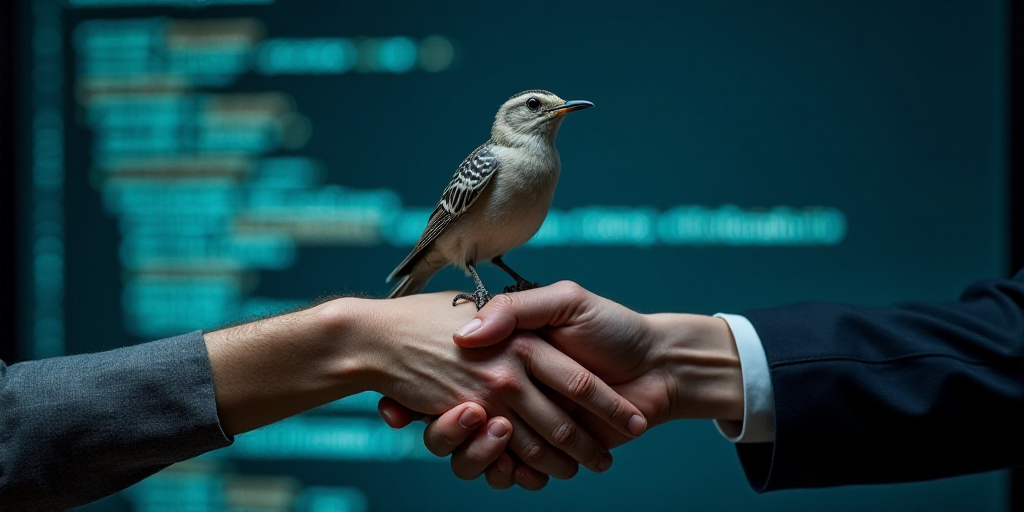Introduction to 222: An AI-Enhanced Social Platform
San Francisco, a summer evening, and five complete strangers… JT Mason attended this gathering confident that he would enjoy himself, thanks to the meticulous selection of attendees by a new type of application designed for meeting people, powered by artificial intelligence (AI).
The platform, named 222, promises something different from typical dating apps.
Mason, a 25-year-old paramedic, shared his experience: “I don’t get the image they want to convey; instead, I have real human beings.”
Prior to the dinner, Mason completed an extensive questionnaire covering details such as his values, interests, tolerance for drugs, personality traits, and other criteria.
After dinner, he joined other app users at a bar, all hoping to make friends or perhaps find something more.
Once contact is established, users can choose whom they’d like to see again and explain their reasons.
According to 222, the application’s AI becomes particularly effective in pairing users after they participate in various events, from dinners to yoga sessions.
“While AI may not yet understand human chemistry, it can serve as the first step towards facilitating real connections,” Mason observed.
The Visionary Behind 222: Keyan Kazemian
Keyan Kazemian, a 26-year-old entrepreneur, and his partners have made it their mission to help people not only in their initial approaches but also in forming long-lasting relationships.
Having worked for Match Group, the parent company of Tinder and Hinge, Kazemian concluded that traditional dating apps “only aim to answer one question: will you swipe right on the next person?”
He noted that most new technologies place people in front of virtual entities rather than other humans, referring to social networks and AI assistants.
The Growing Concern of Loneliness and Its Health Impacts
The increasing difficulties people face in forming meaningful relationships have alarmed health professionals.
In 2017, Vivek Murthy, then the U.S. Surgeon General, described the situation as a “loneliness epidemic.”
In a 2023 report, Murthy warned that “the mortality impact of social disconnection is similar to that caused by smoking 15 cigarettes a day, and even greater than those associated with obesity and physical inactivity.”
He also highlighted increased risks of cardiovascular diseases, dementia, and depression as contributing factors.
Studies suggest that the gradual disappearance of traditional social institutions, addictive digital platforms, and more recently, the pandemic and remote work, have contributed to this issue.
Seeking Connections Through Unconventional Means
When Isabella Epstein moved to New York in 2021 for a job in investment banking, she tried everything to build connections.
Coming from a small rural college in Vermont and accustomed to tight-knit communities, she experimented with apps and joined clubs.
It didn’t work out.
“It was an emotionally complex period for me,” Epstein recalled.
“I ended up approaching strangers on the street, in cafes. I’d tell a woman, ‘I like your style,’ or stop someone and ask, ‘What are you reading?’ People were very receptive.”
Over time, she accumulated hundreds of contacts and organized impromptu events, inviting some to “happy hours” and others to pickleball games, gradually creating her own circle of friends.
Driven to address this widespread problem, Epstein resigned from her job and launched Kndrd, an app targeting women under 40 in New York that allows its approximately 10,000 users to suggest activities and find others interested in joining.
Similar services like 222 and Kndrd have emerged in recent years, including Timeleft, Plots, and Realroots.
Key Questions and Answers
- What is 222? 222 is an AI-enhanced social platform that aims to help people form genuine connections by carefully selecting attendees based on detailed questionnaires and facilitating in-person interactions.
- Who is Keyan Kazemian? Keyan Kazemian is a 26-year-old entrepreneur and co-founder of 222, who aims to help people build meaningful relationships beyond initial approaches.
- Why is loneliness a growing concern? Loneliness has been linked to increased risks of mortality, cardiovascular diseases, dementia, and depression. Factors contributing to this issue include the decline of traditional social institutions, addictive digital platforms, and the pandemic’s impact on human connections.
- What alternative methods are people using to combat loneliness? Individuals like Isabella Epstein have turned to unconventional methods, such as approaching strangers and organizing impromptu events, to build connections and combat loneliness.






